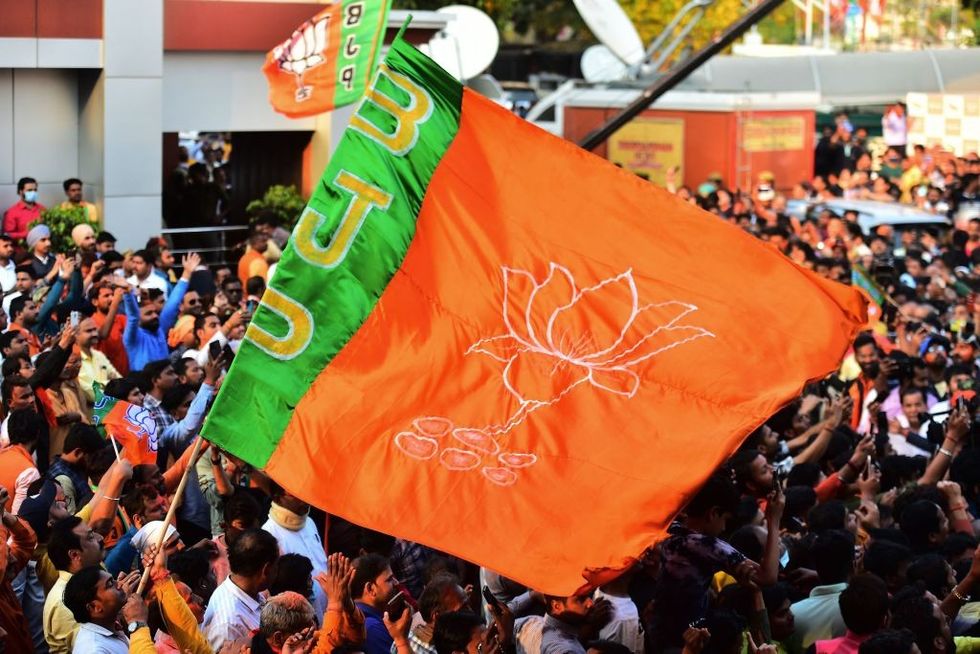TOP officials of India's ruling Hindu nationalist party and an army of its supporters bombarded voters with disinformation as key states went to the polls, specialists say.
The five state votes held over several weeks starting February 10 set the stage for the next general election in 2024, and the ruling BJP retained control of the four it already held, including the country's most populous state of Uttar Pradesh, albeit with a smaller majority there.
But key BJP campaigners distributed false information to voters and followers -- more so than any other party -- fact-checking organisations, including AFP, found.
BJP national spokesperson Sambit Patra shared a doctored video claiming the Samajwadi Party, the main opposition in Uttar Pradesh, had coined a new slogan for its voters: "Vote for the Samajwadi Party to make Uttar Pradesh a new Pakistan."
The core of the BJP's populist appeal is centred on Hindu identity and rivalry with India's Muslim neighbour, and firebrand Hindu monk Yogi Adityanath led the party back to victory in the state -- a bellwether for the country.
"There are false claims like the Samajwadi Party election promise includes renaming the holy Hindu cities," said Pooja Chaudhari, editor of Indian fact-checking site Alt News.
"It is an organised effort by the BJP to portray their rival party as pro-Muslim, pro-Pakistan and anti-Hindu in elections."
In another example, a doctored letter on Samajwadi Party letterhead appealing to its voters to support the BJP was shared tens of thousands of times on social media.
Samajwadi spokesman Ali Khan denounced the letter as a fake and said the party had filed a complaint with the state election commission.
"The BJP is desperate," he said.
Fertile ground for misinformation
India is fertile ground for misinformation. Cheap smartphones and data plans bring more people online, but many are first-time internet users unskilled in discerning fact from fiction.
With nearly half a billion users in the country, instant messaging service WhatsApp is the platform of choice for political parties to reach voters.
All major parties use WhatsApp groups to popularise their ideology, poll promises, and leaders' comments -- and to counter their opponents.
And disinformation, which is deliberately deceptive, is not the preserve of the BJP alone.

Samajwadi followers shared a fake opinion poll attributed to a major Hindi television news channel projecting a big win for the party in multiple fan groups.
Supporters of other groups, including the Congress Party that led India for decades, have also been found peddling disinformation.
But experts say the BJP and its supporters have a far greater social media presence and produce more misleading content than other parties.
The BJP's arm in the state of Maharashtra tweeted last week that prime minister Narendra Modi had brokered a ceasefire between Russian and Ukrainian forces to enable trapped Indian students to escape to safety -- a claim denied by India's own foreign ministry.
"The kind of misinformation which favours BJP or which shows other political parties in poor light, that sort of misinformation dominates the discourse," Alt News co-founder Pratik Sinha said.
"Every election we just see more and more of misinformation, more and more of hate speech, more and more of polarisation of voters along various lines, especially religious lines."
Reports say the BJP created more than 100,000 WhatsApp groups and over 100 Facebook pages for the Uttar Pradesh elections, while its admirers set up more of their own, among them the "Yogi Adityanath group" on Facebook, where it has more than 500,000 followers.
A member of one BJP WhatsApp group told AFP on condition of anonymity that some of them are used to share disinformation about rivals, including doctored videos and morphed photos to malign their image.
"Sometimes we know what we are sharing is not right but it's part of propaganda," he said.
A former BJP IT cell member, who took part in the campaign for the previous Uttar Pradesh elections in 2017, said its strategy was to "misguide".
"A lot of messages are framed in a way to portray that BJP is engaged in the development of the nation but many times the images used in those messages are false," he said.
"There have been instances where images of wide roads, flyovers from some other countries have been falsely used to showcase development by the BJP."
In February, a Facebook page called "Modi Once More" -- with more than 450,000 followers -- showed an image of a gas pipeline it portrayed as being in Uttar Pradesh, but AFP found it came from Germany.
'Social media used to mobilise workers'
The BJP maintains that the social media groups are used to mobilise their workers.
Party spokesperson Sambit Patra did not respond to repeated requests for comment on this story from AFP.
Joyojeet Pal, an associate professor at the School of Information at the University of Michigan, said a deferential social structure was a key contributor to the spread of online falsehoods in the country.
But when people were willing to challenge misinformation, he added, "there is a conversation about it, as opposed to default acceptance".
(AFP)



















